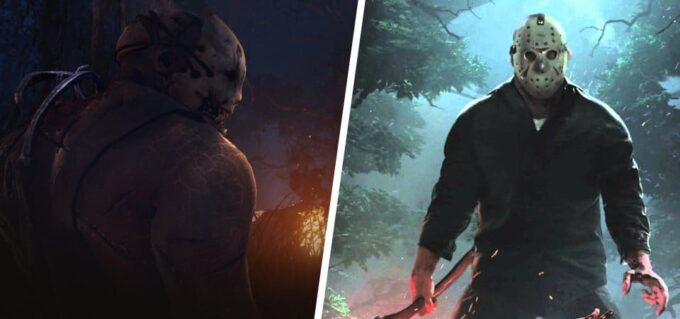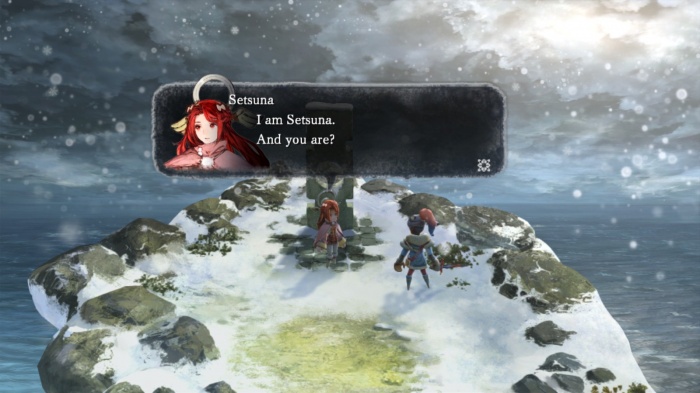Drawing comparisons between Friday the 13th: The Game and Dead by Daylight was inevitable, really. Both stemming from the emerging breed of asymmetrical multiplayer game and leaning in on the horror genre as they do so, they can be a little hard to tell apart when placed side by side. They both have their ups and downs, but having spent hours playing both, there’s a clear winner.
Game Flow
Let’s start with what matters most: how these two games actually play out. Friday the 13th has up to eight survivors working together to outsmart the terrifying, machete-wielding Jason Vorhees. This is done by repairing getaway vehicles, calling the police, or attempting to kill him through a bizarre, multi-step ritual.
There aren’t as many options in Dead by Daylight. Instead, your only means of escape is by powering five of several generators randomly strewn across the map. If successful, you can open two exit doors to evade the other player.
By limiting players to one objective, Dead by Daylight get’s repetitive fast, leaning heavily on that same horror movie trope over and over. Friday the 13th manages to stave off the impending predictability by giving players more to do and more options. Although Jason is more powerful than the killers found in Dead by Daylight, at least his prey have a chance to fight back and even incapacitate him, instead of being forced to flee.
Winner: Friday the 13th
Matchmaking
If you were one of the unfortunate souls attempting to play Friday the 13th during launch week, you’ll remember how long it took to join a game. Waiting 15-20 minutes to get matched was simply ridiculous and early adopters simply had to take it on the chin. Things have dramatically improved since then, though there are still issues.
Friday the 13th is best played with a full lobby of eight players – anything less will tip the scale in Jason’s favour. However, finding seven other players with a stable connection isn’t always easy. There’s also the issue of having to spectate once you’ve been killed during a match. Getting caught off guard by Jason in those opening moments could mean waiting 20 minutes just to finish a game.
Dead by Daylight doesn’t have any of that nonsense. The moment a survivor is killed they have the option to immediately throw themselves back into the matchmaking queue. Jumping between matches is quick and painless, meaning no waiting around and more time in-game. It also gives you the option to queue as a killer or survivor instead of roles being randomly assigned. Naturally, you’ll have some players who will only queue as the killer but in my experience this hasn’t impacted the wait times to get into a match.
Winner: Dead by Daylight
Fear Factor
Now here’s an interesting one. It’s all well and good using horror tropes as a canvas for your multiplayer game, but are they actually scary?
As someone who regularly wastes their allotted TV time binging just about any horror film they can get their hands on, there’s a lot I like about Dead by Daylight. It draws from various corners of the combined horror movie mythos. Players will find themselves in a series of familiar locales from murky swamplands to rundown asylums. The killers are also heavily inspired from your chainsaw-wielding hillbilly to others resembling the Blair Witch and Silent Hill’s spooky nurses.
Although the horror movie aesthetics get a thumbs up, it’s just not that scary in-game. Although powerful, the player-controlled killers will amble around awkwardly and do little to inspire a sense of terror.
When playing Friday the 13th, however, I genuinely felt as though my life was at stake during those first dozen or so matches. The music and setting already create this tangible sense of dread. When you throw Jason into the mix, that tension skyrockets. Compared to the killers from Dead by Daylight, there’s a pedigree that lends him a bone-chilling presence, even when you realise there’s probably a 12-year old kid behind the hockey mask.
Winner: Friday the 13th
Balance
When it comes to asymmetrical multiplayer, balance is key. Whether you tip the odds in favour of one team or the other, there’s always going to be one player left frustrated. So, for developers IllFonic and Behaviour Interactive, there was a need to establish some kind of parity between survivors and their pursuer.
In Friday the 13th, Jason’s insta-kill grab attacks and combination of powers help anchor him as a horror icon. With the ability to teleport and shift between points on the map, he can be anywhere at any time, murdering with ruthless efficiency.
Illfonic manage to create balance through the various means to escape Jason’s clutches, as well as the survivors’ ability to fight back and utilise the environment. If holed up in a cabin, a player can easily keep Jason occupied for a couple of minutes as their teammates mend cars, boats, or attempt to call the cops.
Dead by Daylight seeks to create balance elsewhere. Killers aren’t quite as mobile as Jason though they have the advantage of being able to see where generators are located at all times, indicating objective hotspots on the map. Each killer also has their own special power from cloaking to placing bear traps, though these require skill to master. Survivors may not be able to fight back, but can hide more effectively without being detected. There’s also a chance to rescue team mates once they’ve been downed or captured, though not without putting oneself at risk.
Depending on how the killer goes about their duties determines just how balanced a match can be in Dead by Daylight. If they’re the boring “no risk” kind, then they’ll employ the same foolproof tactic of singling out survivors, downing them, hooking them, and waiting closeby so they can’t be rescued. Each time a player is killed and sacrificed, it reduces the remaining survivors’ chances to escape (the more people repairing generators, the sooner you can open the exit gates).
While both games have balancing issues, Friday the 13th comes out on top here. Jason may be slightly overpowered, but there are plenty of ways to evade and distract him, making sure at least some players can get away. In Dead by Daylight, you either win as a team or die as a team thanks to the narrow victory conditions placed on survivors.
Winner: Friday the 13th
Progression
Having been around almost a year longer on PC, Dead by Daylight has had time to not only improve its core gameplay but develop a rewarding progression system too. Just about every action, from sacrificing players or hiding from the killer, will earn blood points that can be spent on a number of loadout options – some temporary, some permanent. There are also differences between each of the survivors and killers with their own equippable perks and powers. The list of customisation options is far from exhaustive, though they add a certain flair that allows users to subtly tweak their playstyle.
In Friday the 13th, there is also a progression system in place, though it’s not quite as big of a focus point. In-game actions will earn you points that can be spent on survivor perks or new executions for Jason. The perks on offer can be quite handy, but they’re dished out at random, meaning you’ll have to wade through several useless ones before finding one that might actually stick.
Both try different system, but Dead by Daylight ultimately has more rewards to offer its players.
Winner: Dead By Daylight
With the genre only slowly starting to ripen, there’s yet to be a game that can be seen as the defacto template. Until then, studios working within this particular niche will continue to innovate and experiment before one team eventually comes along and cherry-picks the best bits.
Neither Friday the 13th or Dead by Daylight are perfect. Each have their own ups and downs and could certainly learn a thing or two from one another. Still, if we had to choose one, it would be Friday the 13th. Although still rough around the edges, it captures that slasher flick vibe perfectly with its tense build up and terrifying set pieces. Put simply, Dead by Daylight and its more objective-based arenas don’t have the same effect, even if player progression and matchmaking are admittedly better.




